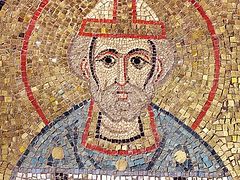Since the fourth century, the draw towards Christianity has only been increasing. People of various classes and cultural levels came to the Church: nobles and servants; highly-educated people and semi-literate simple folk. With few exceptions, these people know very little about Christianity, and sometimes nothing at all. In the person of its priests, and later deacons, the Church takes upon itself the responsibility of familiarizing these people with Sacred Scripture, Christian dogmas, and Christian morality. This teaching was conducted orally. The Greek word χατηχέω (from which comes “catechize”—Trans.) means “to teach orally,” “to announce,” and thus such students are called “catechumens.” There was no specific method for this teaching. Everything depended on the pedagogical tact and skill of the teacher. The diverse makeup and often large size of the audience made it harder to teach, especially if the teacher himself was not very experienced. Experiencing such difficulties, the modest Carthaginian deacon Deogratias, in the year 400, turned to Blessed Augustine, who was already a famous theologian and teacher of the Church, with a request to instruct him in the work of teaching people who were coming to be baptized but who knew nothing of the Christian faith. St. Augustine responded with the small treatise De rudibus catechizandis (On the Teaching of Catechumens).
This little book occupies one of the most venerable places in world pedagogical literature. For its time, it was an unheard of novelty, a real pedagogical revelation. And the advice of the African bishop has not lost its power and significance in our times; its undying value is in the intelligent and high demands placed on both the teacher and the whole style of teaching, which must necessarily be combined with a moral upbringing.
This was already something new. The Roman school was not involved in the upbringing—that was a family affair. It was the family, relying on family traditions and the authority of the elders—father, mother, relatives—that developed the character of a young man and inspired those thoughts and feelings that should guide and support our entire life. In the family it was taught to sacrifice your interests for the sake of the state, to give your life for the freedom and honor of your homeland, to honor its laws, and to protect the dignity and honor of your family and your people. Cicero talks about this kind of upbringing, and according to Pliny the Younger, it was the same in the first century in the empire, at least in the Italian provincial families of the circle that Pliny had in mind.
The school—neither the middle grammar school, nor the higher school of rhetoric— didn’t interfere in this family upbringing, and it didn’t worry about the moral upbringing of its charges. Its goal was to ensure their success, and to make them masters of words, ever able to convince someone of whatever they needed to convince them of. Quintilian could repeat after the Stoics that only a good person could be a good orator, but he himself didn’t think about how to rear this “good person,” and the school certainly didn’t envision this task for itself—neither in the first century when Quintilian was writing, nor in the fourth when St. Augustine was writing. It dealt with something else: showing students how to flourish in this world, and distinguish [themselves] in the science of speech, which should [bring] honor amongst men, and deceitful riches!”1 In the words of St. Augustine, the school led to the “white road” of worldly prosperity. It didn’t even think about providing its students with a stock of firm moral values on this road.
The teaching activity of the Church—with Blessed Augustine acting on its behalf—looms large against this background. The catechist must not only familiarize the novice with this unknown faith, but he must also place the elements of Christian ethics in his soul, and begin the formation of a Christian soul. The teaching of the faith and the upbringing of the soul in this faith are inseparable one from the other. All teaching must be conducted with one goal—to instill in the student that there are two cornerstones of the commandments: love for God and love for neighbor. “The gaze of the person whom we are instructing by our utterance ought to be moved toward” these commandments (3.4). “Whatever you narrate, narrate it in such a way that your listener might come to believe; and believing might hope; and hoping might love” (5.11). Introducing the student to the events of Old and New Testament history, “it is necessary to indicate the reason and meaning for everything we narrate to them. This will help bring the entire narration to the main purpose—to love, which we must never take our eyes off of, whatever we do or say” (7.1).
It’s not enough to show the student the content of his new life and the path to it—you have to deliver him from those stumbling blocks that are most often encountered on this path. You must: warn against heresies (2.1), warn against society, which should be avoided (8.3), tell him about the inhumanity of worldly entertainments (21), and dispel any disappointment in the Christian community, which includes so many bad people: “One must not think the devil will remain victorious because he has drawn many to himself: The few will overcome him” (24.11).
How can we teach so that this great variety of material—not just new, but completely foreign to someone who grew up with the concepts and attitudes of pagan religion—doesn’t immediately scare someone away; doesn’t seem like “temptation and madness?”
St. Augustine gives the catechist a wide variety of recommendations and instructions, but all imbued with the same spirit. The teacher should be attentive and caring towards the student: He establishes simple friendly relations with him, constantly monitoring how he assimilates this new material, taking into account the peculiarities of his mental and spiritual disposition, above all fearing to offend and wound him. He must show care for him in all things, beginning with the simplest matter: seating the student, so he can calmly and comfortably listen to the teacher. This demand, so natural for us, which we take for granted, involved St. Augustine in a kind of “ideological battle” with the African Church, which had the ingrained custom of demanding that the laity stand in the presence of clergy. St. Augustine sharply protested: “Who can endure our arrogance when we don’t permit men, our brethren, and those for whom we should have the main concern of making our brethren, to sit in front of us, seeing that even a woman sat as she listened to the Lord Himself, Who is served by angels?” (16.4). Let the catechist, after speaking, observe the impression of his words: If they don’t move the student at all, then he must try everything “to stir him up and draw him forth as it were from his place of concealment. For the fear that prevents the declaration of his judgment must be driven out by kindly exhortation; and by bringing our fraternal affinity to his attention, we must temper his reverence for us; and by questioning him, we should ascertain what’s left unclear, and assure the listener that he is free to express any objection that he deems necessary… And we must proceed in accordance with his answer, and speak more simply and more clearly… not lingering on what he already knows… If the listener is very sluggish, we must mercifully bear with him… and hammer home the most essential things, on the unity of faith, on temptations, and on the Christian way of life. You mustn’t talk to such a person so much about God as you talk to God about him” (15.2-4).
A skillful selection of events from the Old and New Testament should be made: You have to arouse the student’s interest, but not overload and wear out his memory. And the goal of every lesson, its true meaning, is to inspire the student, to educate him in “love from a pure heart, a good conscience, and sincere faith” (3.2-3); this is “like the gold which binds together a row of gems” (7.13). Don’t wear the student out; noticing that he “opens his mouth not for some approving words, but for a yawn… let’s give his soul a rest, and season our words with a cheerful joke, decent and suitable for our topic, or tell about something wondrous and amazing… And most importantly, let’s talk about something that affects him, so the sense of self-concern may keep his attention on the alert” (16.2).
The ancient school didn’t really consider the characteristics and individual inclinations of the student. The teacher, however, was charged with taking note of what the student was more inclined to—history, poetry, or the study of law, and what kind of speech—concise and narrow, or elegant and embellished in every possible way—was more successful with him; but all education was done according to the same plan. Everyone wrote about the same topics and read and analyzed the same authors. A rhetoric school teacher addressed young men of approximately the same age and the same level of education: All his students came to him from grammar school.
The position of the catechist is much more complicated: He was dealing with adults (it wasn’t customary to baptize in childhood yet in the fourth century) of various cultural and social strata. He had peasants coming to him, often with difficulty coping with Latin speech, as well as people who were educated in philosophy.
Blessed Augustine structured his teaching in different ways, depending on whether the student was learned or ignorant, a citizen or a foreigner, rich or poor (20.4). He left to Deogratias for his edification a model of a lesson for a simple Carthaginian citizen (which is very interesting for characterizing the people of this stratum and the state of the African Church at that time) (21.37), and highlighted two other cases: when it’s not simple people coming to be baptized, but people of high culture, “with minds refined by thoughts about higher things” (10.1), or those who have graduated from rhetoric school. Regarding the first, he says that “such people usually carefully inquire into everything, even before becoming Christian.” He doesn’t need “to hear from you as a teacher that which he already knows” (9.1-2). You should have a “quiet, modest conversation” with him, to inquire as to why he wanted to become a Christian, to find out what books he has read, to explain the harm of heretical writings (thus a catechist should be well aware of both Orthodox and heretical literature) and in general, to warn about the temptations of thought and too much trust in reason: Powerless to penetrate into sacred things, it can deviate from the truth to the semblance of what is true (9.6-7). Despite this reservation, those who came “into the circle of Christ’s people” as a result of their reflections on higher things inspired respect in St. Augustine.
His advice for those who finished rhetoric school is imbued with a completely different feeling. St. Augustine himself came from this school, taught for a long time there, owed his high oratorical skills to it to a large degree, and understood perfectly well what was its main drawback: The word not only obscured the matter, but replaced it; it led away from research and reflection to irresponsible and unthinking love for a burst of beautiful phrases. “Verbal abundance is likened to a reliable and incontrovertible chain of evidence,” complained Minucius Felix, one of the first Christian apologists. The adoration of the word had to be overcome: “From Thee therefore, I had now learned,” St. Augustine says to God, “that because a thing is eloquently expressed, it should not of necessity seem to be true; nor, because uttered with stammering lips, should it be false.”2 But the school of rhetoric was highly valued by St. Augustine’s contemporaries, and people who graduated form it were imbued with the proud consciousness of their superiority over the ignorant crowd that knew not how to speak correctly. Here the catechist had a great task. “Such people, who believe they have surpassed all other people thanks to the art of speech… must be admonished to cease despising those who have learned to avoid moral vices more than faults of language” (10.2). “The most useful thing for them is to understand … that ideas are to be preferred to words… Let them know that the only voice that reaches God’s ears is that of the affection of the soul; thus they won’t mock the barbarism and solecisms they sometimes hear from the mouth of the priest: Good pronunciation, having such significance in the forum, may mean nothing in church” (10.4-6).
Blessed Augustine’s De rudibus catechizandis served as a guide for probably many catechists, but in this book he addressed himself directly to Deogratias, whose figure shines quite clearly through the verbal fabric of St. Augustine’s letter. A nervous, impressionable young man, inclined towards mystical contemplation, very proud, having painfully experienced his teaching failures, often imaginary and always exaggerated, with a love of books and solitude; an educated man and proud of his knowledge in the recesses of his soul, he was a real martyr of his position as a catechist, which forced him to communicate with people who had to be taught the basics of the Christian faith, which they often perceived only with difficulty (it’s not for nothing that St. Augustine often repeated, when speaking of the work of a catechist, the verb “inculcare”—“to drive/hammer in”). He desired “to expound in long and complex intricacies that his mind could instantly absorb and assimilate,” but he was compelled “to come down from the heights of our own conceptions and dwell long on ideas far below our own standard” (12.1). He certainly wasn’t suffering from an excess of love for these wards of his, who somehow perceived the basics, and St. Augustine showed him the ideal of a teacher.
We know little about the teachers of the ancient school. The brief biographical notes of Seutonius don’t provide material for describing its “glorious grammarians” namely as teachers. Quintilian demanded that teachers relate to their students as a father, but he didn’t give this requirement any specific content. Blessed Augustine was the first to elaborate on the teacher-student relationship—this has already been discussed—and the first to present two basic requirements to the teacher: He should love his work—“They more willingly hear us when we ourselves enjoy teaching: Our joy colors our speech; it’s easier for us to speak and to be understood” (2.12); but in order to teach joyfully, not “in a fog of boredom,” the words must come from the teacher’s mouth “from an excess of love” (19.5). A teacher must love his students, “and only then will it go well, if the worker strives for it, driven by love” (13.8). St. Augustine found fervent words to describe this love. Let the unlearned sit before the teacher—“Let us meet these children with a fraternal, paternal, and maternal love; let us unite our hearts with their hearts, and familiar words will seem new to us. Such is the power of a sympathetic mind. When our words touch them, we, teaching them, dwell within them, and they, learning, dwell within us, as if they speak from within us, and we ourselves somehow learn from them that which we are teaching” (14.1). And he fixes the image of the teacher with a touching comparison: “Let the thought of a hen ever remain in your heart: She is exhausted, but covers her tender brood with her feathers; her voice is hoarse, and yet she summons her chirping young ones; if they don’t take cover under her fostering wings, they will become prey to birds of prey” (12.5). The teacher not only conveys information: He is the defender and guardian of his students.
Blessed Augustine was an African bishop when he wrote for Deogratias. Some of his advice has meaning and value only for his time (the fourth century) and his country, but there is also advice in his book that time is powerless to crush: Blessed Augustine gave us his ideal of a teacher for the ages, for all countries, for all times.





